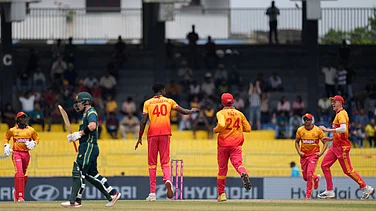As an eerie silence fell across the stands of the Narendra Modi Stadium in Ahmedabad, a singular realisation hit the collective conscience of those draped in blue inside and outside the grand arena: Australia, so often India’s tormentor-in-chief, had managed to break our hearts again. Five-time world champions previously, Australia beat the hitherto unbeaten hosts for their sixth ODI crown, extending a record that seems to be getting more unsurmountable year after year. (More Cricket News)
Cricket is India’s game; the country lives and breathes the sport, suffers through each heartbreak as one, and celebrates each jubilation, however small, together. It is unimaginable, then, that some have frequently bested India at something that feels, almost selfishly, proprietary. If Australia are the nefarious villain to the Indian eye, rubbing hands together and laughing maniacally as they get one over the heroes again and again and again, South Africa are the wicked aide, the boss before the boss.
ALSO READ: RSA Vs IND - Three Things To Look Forward To
India and South Africa, like the rest of the cricket world, share a common sporting ancestor: England. The two nations developed a niche for the sport sometime in their respective colonial histories and began playing competitively as independent countries after their occupiers had withdrawn forces back into their motherland.
Since their first meeting that transpired echelons ago, India and South Africa have contested 42 Test matches, with the latter ahead in the head-to-head record at the time of writing by 17 to 15. India have lost 40 per cent of the games contested in the format against the Proteas, their second-worst-such record after Australia.
The One Day Internationals between the two nations have followed the same trajectory; of the 91 games these two teams have played, South Africa have won 50 to India’s 38, with three ending in an inconclusive result. India have won just 41 per cent of their ODI bouts against South Africa, only managing a worse output against - and no surprises here - Australia. T20 Internationals do, however, offer some respite to the Men in Blue: they have won 13 of the 24 games against the Proteas and lost 10.
A curtain ban on South Africa due to their discriminatory apartheid loss prevented the nation from contesting with other International Cricket Council members “officially” until 1991. They broke their abstinence after a 20-year wait against India in Kolkata on November 10, losing by three wickets in a One Day International. The year after, India toured South Africa for their first sanctioned excursion but returned home with disappointing results; South Africa, in the wilderness for so long, had beaten the then-one-time ICC Cricket World Cup winners in both the Test and the One-Day series.
ALSO READ: India Squads For South Africa Tour 2023-24
In the present day, India will return to South Africa two years after their latest tour. The Men in Blue voyaged across the Rainbow Nation in late 2021 and early 2022; they lost the Test series 2-1 and the ODI bouts 3-0.
Besides the bilateral tours, India and South Africa have frequently clashed in the World Cups - both ODI and T20I. Of the six games the two have played in the ODI World Cup, both have won three. South Africa, in fact, won the first three meetings between them before India’s renewed mastery in the white-ball format helped them restore parity in the head-to-head. In the T20 World Cup, the Men in Blue lead the Proteas 4-2.
Moreover, confrontations between the two cricketing nations have often spilt beyond the green grass and dusky pitches and into the murky, grey areas that threaten the moral fibre of the Gentleman’s Game. It was during one such contest that South Africa captain Hansie Cronje was exposed as a co-conspirator in a match-fixing scandal and later banned from the sport for life. Later, in another unrelated clash, Indian cricketing legend Sachin Tendulkar was caught tampering with the ball and suspended for one Test match.
Still, when India and South Africa meet on a cricket field, the ills of the past are forgotten. The focus shifts to the field instead, where the battle between two great cricketing nations has and continues to capture the hearts and minds of those who live and breathe cricket.


























